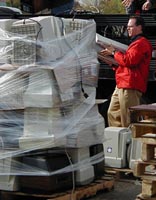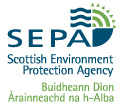Related Research Articles

The Environmental Protection Agency (EPA) is an independent agency of the United States government tasked with environmental protection matters. President Richard Nixon proposed the establishment of EPA on July 9, 1970; it began operation on December 2, 1970, after Nixon signed an executive order. The order establishing the EPA was ratified by committee hearings in the House and Senate.

Infrastructure is the set of facilities and systems that serve a country, city, or other area, and encompasses the services and facilities necessary for its economy, households and firms to function. Infrastructure is composed of public and private physical structures such as roads, railways, bridges, tunnels, water supply, sewers, electrical grids, and telecommunications. In general, infrastructure has been defined as "the physical components of interrelated systems providing commodities and services essential to enable, sustain, or enhance societal living conditions" and maintain the surrounding environment.

Industrial waste is the waste produced by industrial activity which includes any material that is rendered useless during a manufacturing process such as that of factories, mills, and mining operations. Types of industrial waste include dirt and gravel, masonry and concrete, scrap metal, oil, solvents, chemicals, scrap lumber, even vegetable matter from restaurants. Industrial waste may be solid, semi-solid or liquid in form. It may be hazardous waste or non-hazardous waste. Industrial waste may pollute the nearby soil or adjacent water bodies, and can contaminate groundwater, lakes, streams, rivers or coastal waters. Industrial waste is often mixed into municipal waste, making accurate assessments difficult. An estimate for the US goes as high as 7.6 billion tons of industrial waste produced annually, as of 2017. Most countries have enacted legislation to deal with the problem of industrial waste, but strictness and compliance regimes vary. Enforcement is always an issue.
The Environment Agency (EA) is a non-departmental public body, established in 1996 and sponsored by the United Kingdom government's Department for Environment, Food and Rural Affairs, with responsibilities relating to the protection and enhancement of the environment in England.

The Treasurerof Australia, also known as the FederalTreasurer or more simply the Treasurer, is the minister of state of the Commonwealth of Australia charged with overseeing government revenue collection, federal expenditure and economic policy as the head of the Department of the Treasury. The current treasurer is Jim Chalmers, who was selected by Prime Minister Anthony Albanese in May 2022 following the 2022 Australian federal election.

Electronic waste recycling, electronics recycling, or e-waste recycling is the disassembly and separation of components and raw materials of waste electronics; when referring to specific types of e-waste, the terms like computer recycling or mobile phone recycling may be used. Like other waste streams, reuse, donation, and repair are common sustainable ways to dispose of IT waste.

The Scottish Environment Protection Agency is Scotland's environmental regulator and national flood forecasting, flood warning and strategic flood risk management authority. Its main role is to protect and improve Scotland's environment. SEPA does this by helping business and industry to understand their environmental responsibilities, enabling customers to comply with legislation and good practice and to realise the economic benefits of good environmental practice. One of the ways SEPA does this is through the NetRegs environmental guidance service. It protects communities by regulating activities that can cause harmful pollution and by monitoring the quality of Scotland's air, land and water. The regulations it implements also cover the storage, transport and disposal of radioactive materials.

Environment Agency Wales was a Welsh Government sponsored body that was part of the Environment Agency of England and Wales from 1996 to 2013. Its principal aims were to protect and improve the environment in Wales and to promote sustainable development. On 1 April 2013 the organisation was merged with the Countryside Council for Wales and Forestry Commission Wales into a single environmental body, Natural Resources Wales.

The Ministry of Environment is the South Korea branch of government charged with environmental protection. In addition to enforcing regulations and sponsoring ecological research, the Ministry manages the national parks of South Korea. Its headquarters is in Sejong City.

Environmental crime is an illegal act which directly harms the environment. These illegal activities involve the environment, wildlife, biodiversity and natural resources. International bodies such as, G7, Interpol, European Union, United Nations Environment Program, United Nations Interregional Crime and Justice Research Institute, have recognized the following environmental crimes:
The Illinois Department of Transportation (IDOT) is a state agency in charge of state-maintained public roadways of the U.S. state of Illinois. In addition, IDOT provides funding for rail, public transit and airport projects and administers fuel tax and federal funding to local jurisdictions in the state. The Secretary of Transportation reports to the Governor of Illinois. IDOT is headquartered in unincorporated Sangamon County, located near the state capital, Springfield. In addition, the IDOT Division of Highways has offices in nine locations throughout the state.

The New York State Department of Environmental Conservation is a department of New York state government. The department guides and regulates the conservation, improvement, and protection of New York's natural resources; manages Forest Preserve lands in the Adirondack and Catskill parks, state forest lands, and wildlife management areas; regulates sport fishing, hunting and trapping; and enforces the state's environmental laws and regulations. Its regulations are compiled in Title 6 of the New York Codes, Rules and Regulations. It was founded in 1970, replacing the Conservation Department, and is headed by Basil Seggos.
Water supply and sanitation (WSS) in the European Union (EU) is the responsibility of each member state, but in the 21st century union-wide policies have come into effect. Water resources are limited and supply and sanitation systems are under pressure from urbanisation and climate change. Indeed, the stakes are high as the European Environmental Agency found that one European out of ten already suffers a situation of water scarcity and the IEA measured the energy consumption of the water sector to be equivalent to 3,5% of the electricity consumption of the EU.
Water supply and sanitation in Indonesia is characterized by poor levels of access and service quality. More than 16 million people lack access to an at least basic water source and almost 33 million of the country's 275 million population has no access to at least basic sanitation. Only about 2% of people have access to sewerage in urban areas; this is one of the lowest in the world among middle-income countries. Water pollution is widespread on Bali and Java. Women in Jakarta report spending US$11 per month on boiling water, implying a significant burden for the poor.

Waste are unwanted or unusable materials. Waste is any substance discarded after primary use, or is worthless, defective and of no use. A by-product, by contrast is a joint product of relatively minor economic value. A waste product may become a by-product, joint product or resource through an invention that raises a waste product's value above zero.
The Michigan Department of Technology, Management & Budget (DTMB), formerly Michigan Department of Management and Budget, is a principal department of the government of Michigan responsible for various support functions within the government.
The Florida Department of Management Services (DMS) functions as the business division of the Florida government. Its primary role is to provide support to other state agencies and both current and former state employees, focusing on workforce and business-related functions. This enables these agencies and individuals to concentrate on their principal missions as stipulated by law. The motto of the agency is "We Serve Those Who Serve Florida."
Solid waste policy in the United States is aimed at developing and implementing proper mechanisms to effectively manage solid waste. For solid waste policy to be effective, inputs should come from stakeholders, including citizens, businesses, community-based organizations, non-governmental organizations, government agencies, universities, and other research organizations. These inputs form the basis of policy frameworks that influence solid waste management decisions. In the United States, the Environmental Protection Agency (EPA) regulates household, industrial, manufacturing, and commercial solid and hazardous wastes under the 1976 Resource Conservation and Recovery Act (RCRA). Effective solid waste management is a cooperative effort involving federal, state, regional, and local entities. Thus, the RCRA's Solid Waste program section D encourages the environmental departments of each state to develop comprehensive plans to manage nonhazardous industrial and municipal solid waste.
Waste management in Russia refers to the legislation, actions and processes pertaining to the management of the various waste types encountered throughout the Russian Federation. The basis of legal governance for waste management in Russia at the federal level is outlined through Federal Law No. 89-FZ, which defines waste as “the remains of raw materials, materials, semi-finished products, other articles or products that have been formed in the process of production or consumption as well as the goods (products) that have lost their consumer properties”.
Turkey generates about 30 million tons of solid municipal waste per year; the annual amount of waste generated per capita amounts to about 400 kilograms. According to Waste Atlas, Turkey's waste collection coverage rate is 77%, whereas its unsound waste disposal rate is 69%. While the country has a strong legal framework in terms of laying down common provisions for waste management, the implementation process has been considered slow since the beginning of 1990s.
References
- ↑ Mitee, Leesi (2010). Laws of Rivers State of Nigeria: An Encyclopaedic Guide. Worldwide Business Resources. p. 172. ISBN 0-9561988-1-3 . Retrieved 13 May 2015.
- ↑ Anosike, Ngozi (26 September 2012). "RSESA Law To Be Repealed Soon…As RSHA Gives Waste Management Bill First Reading". National Network . Retrieved 18 May 2015.
- ↑ "who we are". www.riwama.com.ng. Retrieved 2024-08-29.